Cheng Lei’s release not a precondition for China trip, says Anthony Albanese
Anthony Albanese says the release of detained Australian journalist Cheng Lei is not a precondition for his China visit

Anthony Albanese says his visit to China is not conditional on the release by Beijing of detained Australian journalist Cheng Lei, but argued she should not be “kept in detention in the way that she has”.
The Prime Minister said on Friday that “visits and engagement and dialogue should not be transactional”, arguing that the “worst thing that can happen between nations that have disagreements is that they stop talking”.
Mr Albanese will travel on a state visit to Washington DC for talks with Joe Biden on October 25, and clarified on Friday the government was finalising dates for a China visit expected to coincide with the 50th anniversary of Gough Whitlam’s first trip as prime minister at the end of October 1973.
A meeting between Mr Albanese and Chinese President Xi Jinping is also expected to occur on the sidelines of next month’s G20 leaders’ summit in India.
Mr Albanese provided an assurance on Friday the government would “always stand up for the interests of Australian citizens” after the 48-year-old Cheng revealed in a public statement that she could only see sunlight for 10 hours a year from inside her Beijing prison cell.
Cheng was detained by the Chinese Ministry of State Security three years ago this Sunday, with the journalist saying she missed her 14-year old daughter and her 12-year-old son.
Mr Albanese said that “whenever meetings have been held, whether it’s myself or when I’ve met with President Xi, or our Foreign Minister, or our Trade Minister, with their counterparts, we always raise the issues of Australian citizens”.
Foreign Minister Penny Wong said this weekend marked “three years since Australian citizen Cheng Lei was detained in China”. “All Australians want to see her reunited with her children. Australia has consistently advocated for Ms Cheng, and asked that basic standards of justice, procedural fairness and humane treatment to be met for Ms Cheng, in accordance with international norms,” Senator Wong said.
Opposition foreign affairs spokesman Simon Birmingham said the letter from Cheng Lei brought home the “injustice of her continuing detention on secret charges, following a secret trial and the repeated deferral of a verdict”.
Senator Birmingham said the Coalition repeated its “call on Chinese authorities to end this matter and release Ms Cheng and allow her to return home to her loved ones”.
Mr Albanese clarified he would not make Ms Cheng’s release a condition for his China visit and welcomed the resolution of Australia’s trade dispute with Beijing over barley.
“I’ve said consistently over a long period of time, visits and engagement and dialogue should not be transactional,” he said. “Visits and dialogue are something that in themselves are constructive.”
Mr Albanese said Australia was doing well in removing the impediments to the trade relationship with China.
“The (barley) industry was worth in exports to China over $900m in 2019,” he said. “Today, the prospects are it’s worth substantially more.”




To join the conversation, please log in. Don't have an account? Register
Join the conversation, you are commenting as Logout